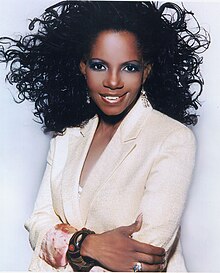Melba Moore
| Melba Moore | |
|---|---|
 |
|
| Born |
Beatrice Melba Hill October 29, 1945 New York City, New York, U.S. |
| Residence | New York City, New York, US |
| Occupation | |
| Years active | 1966–present |
| Spouse(s) | Charles Huggins (m. 1975–91) |
| Website | Official website |
| Musical career | |
| Genres | |
| Instruments | vocalist |
| Labels | |
| Associated acts | |
Beatrice Melba Hill (born October 29, 1945), known by her stage name, Melba Moore is an American singer, actress, voice actress, and entertainer. Moore is the daughter of saxophonist Teddy Hill and R&B singer Bonnie Davis. She is best known for the voice of the Whippet Angel in All Dogs Go to Heaven, and Tibi the Take it Back Butterfly in Yakety Yak, Take it Back, and Trash Talk.
Moore was born Beatrice Melba Hill on October 29, 1945 in New York City, New York, to Gertrude Melba Smith (known professionally as Bonnie Davis) and Teddy Hill, and raised in Harlem, New York, until she was 9 and her divorced mother remarried jazz pianist Clement Leroy Moorman. She attended Newark Arts High School in Newark, New Jersey, Graduating in 1958. Her mother, Bonnie Davis, had a No. 1 R&B hit with "Don't Stop Now", prior to Melba's birth. Although her biological father was Big Band leader and saxophonist Teddy Hill, it was her stepfather Moorman (who played on "Don't Stop Now") who became a prime influence and encouragement in Moore's musical pursuits, insisting that she learn to play the piano. When she graduated from college she worked as a music teacher, but she soon decided to pursue the spotlight.
Moore began her performing career in 1967 as Dionne in the original cast of the musical Hair along with Ronnie Dyson and Diane Keaton. Moore replaced Keaton in the role of Sheila. In 1970, she won a Tony Award for Best Performance by a Featured Actress in a Musical for her portrayal of Lutiebelle in Purlie. She would not return to Broadway until 1978 when she appeared (as Marsinah) with Eartha Kitt in Timbuktu! but left the show after a few weeks and was replaced by Vanessa Shaw. Following the success of Purlie, Moore landed two big-screen film roles, released two successful albums, 1970's I Got Love and Look What You're Doing to the Man, and co-starred with actor Clifton Davis in the then-couple's own successful variety television series in 1972. Both Moore and Davis revealed that the show was canceled after its brief run when their relationship ended. When Moore's managers and accountants left her in 1973, she returned to Newark and began singing in benefit concerts. Her career picked up after she met record manager and business promoter Charles Huggins after a performance at the Apollo Theater in 1974. They married in 1975.
...
Wikipedia
